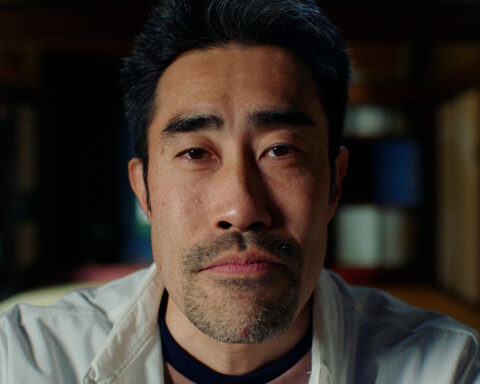Whatever happened to the great Canadian docs that were made especially for TV? They won Emmys, rave reviews and respectable audience numbers and yet, like the hapless characters in Up in the Air, they’ve been downsized despite years of diligent and faithful service. It was a question I asked myself while directing a one-hour TV doc, Romeos & Juliets, for the CBC in 2012. The film was a rare foray back into the performing arts, for which I was grateful, and yet I wondered if it was part of the diminishing trend of director-driven TV docs to be given the bad news by a metaphorical version of George Clooney.
Was I alone in these thoughts? Surely, others remembered the glorious group of docs with such titles as My Left Breast, Claude Jutra: An Unfinished Story, Dying at Grace, Genius Within: The Inner Life of Glenn Gould, Paris 1919, General Idea: Art, AIDS and the Fin de Siècle, Girl Inside, Passage, and Mordecai Richler: The Last of the Wild Jews. They were the kind of films that contributed to Canada’s glowing international reputation as the producer of great, stirring documentaries. Weren’t there other producers, directors and distributors noticing the vacated chairs and desks in the doc offices at Canada’s private broadcasters—and especially at the CBC? “What good is sitting alone in your room,” I heard Cabaret’s Sally Bowles whispering: “Talk to people. Find out where the music went.”
So, off I went across the country to talk to some of the leading players in the TV doc game, including directors, producers, broadcasters and distributors. It was mostly done via email, Skype and telephone. (For our young readers, “the telephone” is a communication device used by people over 25.) And what emerged was not a set of congruent ideas as to the state of TV docs today but rather a variety of divergent views that ultimately pointed to the complexity of the question itself. I should’ve known better: It was like going out to ask people about the meaning of life and hoping for an answer like “Eat well, exercise and call your mother.” Yes, money, of course, was a big player in the larger equation but, to my surprise, so was the notion that the success of the genre had also contributed to its woes.
First place of call was Vancouver, where I found Rudy Buttignol, who certainly knows a thing or two about TV docs. The Italian-born dynamo began his career producing and directing docs like The Dairy, Jack Bush, and Soviet Space: The Secret Designer before making the leap into broadcasting as the commissioning editor at TVOntario. There, he greenlit an astonishing array of docs with such titles as The Corporation, Dying at Grace and Manufactured Landscapes. Today, he’s the president and CEO of B.C.’s Knowledge Network, where, amongst other things, he oversees the programming of an impressive group of curated series. He reminded me that TV docs have been sort of unravelling from the beginning: “The expansion of cable in the ’70s and ’80s meant that entire channels could be devoted to docs,” he explains, “which in turn ramped up production that proved great for filmmakers. But the commercial broadcasters found themselves at the same table as public broadcasters and they started asking: ‘Why are we doing the same thing as you guys? Leave the big important docs to the public sector [i.e., CBC and TVO], who were doing very well by them already.’” As I listened to Buttignol, I realized that that divide remains to this day—which, in turn, got me thinking if something was lost as a result. After all, HBO has done very well by docs made especially for them, enough so that people are actually paying to watch docs on TV. Wouldn’t Canadians want to watch such engrossing works as Chasing Madoff, Teenage Paparazzo and The Laramie Project, all popular and critical favourites, if the commercial networks upped the ante and offered similar films for free?
OK, I can hear the counterarguments already, so, I’ll just march in and own it: yes, one-off TV docs are extremely difficult to finance and promote and even harder to programme. And therein lies the conundrum for the contemporary documentarian: How do you make your films compete with the type of documentary series that are now dotting the TV landscape? My own sense is that if a film is good, audiences will reach for it. John Walker, the acclaimed documentary director who makes his home in Halifax, nudged this notion into a phone conversation a few days later. His film Men of the Deeps (2003), a moving portrait of Cape Breton minors, aired on CTV, attracting close to 950,000 viewers. In regular broadcast terms, this is known as “good numbers.” In documentary terms this would be like selling out the SkyDome—oops, Rogers Centre—30 times over. “Docs can deliver,” Walker stressed. “But what made the film so successful was that CTV put a strategy behind the promotion. For example, they put spots during one of their highest-rated shows, The West Wing, and it really paid off. There has to be a will and there was definitely a strong will on the part of CTV, the broadcaster. Not sure if you really see that anymore today.”
Walker’s sentiments are echoed a short time later by Peter Raymont, an equally respected documentary maverick who has created some of the most recognizable titles in the genre. Genius Within: The Inner Life of Glenn Gould and Shake Hands with the Devil: The Journey of Roméo Dallaire (2004) are only two of the nearly 60 films he has directed and produced over the years. Despite the fact that Gould was short-listed for an Oscar and Devil won an International Emmy—and both attracted sizeable audiences—his brand of films have fewer and fewer outlets. “Look,” he says to me over a quick coffee, “it’s pretty bleak right now. Bravo! is gone and CBC is doing less, other than the ones narrated by Ann-Marie MacDonald on Doc Zone. Gone, too, is the idea that docs can change the world or show the beauty in something. But I can’t be making films that I won’t be proud of 10 years from now.” Indeed Raymont’s focus seems now set on dramatic series, having executive-produced the highly successful The Border for CBC and fulfilling similar chores most recently for Cracked, also for CBC. “What we need now are programming streams where you can show more varied docs, because the desire to watch them is still out there. If they’re turning out in droves to watch them in theatres, why not on TV?”
“Well, it’s the best of times. And it’s the worst of times.” The speaker is Gerry Flahive, the highly seasoned and accomplished NFB producer of over 40 documentary films, including Waterlife (2009) and Paris 1919. “Television is the defining frame for docs,” Flahive explains. “But the fact is that television has dropped the ball on them. They are seen as ‘too smart for TV.’ And whenever they do appear, they are still bound up in old forms, with a host, narrator and a chronological form of storytelling. But you’ve got to take risks. The worst thing you can to is to avoid risks. It’s actually safer to take risks.” The risks Flahive speaks of were certainly all over Paris 1919, a doc that could have landed with a dull thud in a pitch meeting with a broadcaster. A documentary about the Paris Peace Conference of 1919, you say? Any showgirls or chase scenes? That Paul Cowan, the director, fashioned a stylish and fascinating doc using archival footage and dramatic recreations is a testament to the faith the NFB places on director-driven docs. But the ultimate proof of its popularity came from the audience itself, who watched in decent numbers: nearly 3 million viewers on various networks, including Canada, France, Australia and Finland, watched the story of how 32 countries came together in the aftermath of World War I to discuss treaties that reshaped the map of Europe.
So, if TV docs can be so successful, why aren’t we seeing more of them? Like sex, if it’s going well why opt instead for hula hooping? “Well, part of the issue is that the success of docs brought more players in the game. There are more documentary players today than ever before.” I’m on the phone now to Jan Rofekamp, the president and CEO of Montreal-based Films Transit International, one of the longest running and most respected sales companies of quality documentaries in the world. (The fact that Rofekamp has lasted as long as he has —his company was formed in 1982—must say something about his Dutch-born tenacity, intelligence and strength.) “And with more players, there is more product on the international market, which makes the price go down. On the one hand, it’s good that we have more wonderful talent coming forward, but where I was able to sell a doc in the past to the BBC for about £60,000, it’s down now to about £20,000. It’s even less in countries like Scandinavia who offer anywhere between €3,000 to €6,000. It makes it tough, not only for me but for the doc producers as well.”
So, what to make of all this? On a TV landscape filled with the “reality” of scheming dance moms, plastic surgery brides, toddler beauty pageants, horny hillbillies and gun-totin’ former Alaskan senators, it’s hard not to think the end of civilization is upon us. And yet there’s no denying the fact that reality TV has had a huge impact on the traditional TV doc. In some ways, reality TV is the high-rise condo that flattened out acres of lovely heritage homes—they’re cheap and efficient, but at the expense of solid tradition and aesthetic value. And sooner or later, most of us might buy into one.
But it’s not all gloom and doom: As I circled back to Toronto to talk to two of the most important TV doc broadcasters, the mood shifted enough that I held off downing that bottle of Scotch. At both Discovery and History channels, there are both documentary series and one-off strains that may not have huge advertising budgets but are doing quite well. Discovery’s docu-series like Mythbusters, Auction Kings and Licence to Drill are pulling in some of the best ratings in its history, with Sunday- and Thursday-night slots reserved for oneoffs. “Yes, the one-hour docs are more expensive and not as easy to programme as the series where you have the audience coming back, week after week,” explains Edwina Follows, the bright and energetic director of commissioning and production at Discovery. “But we’ve had much success also with our big, blue-chip specials like Earth From Space, which uses a lot of gorgeous CGI to explore the Earth’s mysteries. The key, though, is for producers to know our audience. Yes, you have to have high stakes and lots of cool information you can take away but we also set a high bar for authenticity. That’s the mark of any good documentary.”
Over at History, it is the series that are also pulling in the bacon, with such docu-soaps as Ice Pilots and Canadian Pickers offering up tasty numbers. “We are definitely more focused on series but we do a small number of one-offs—about six a year for History and an additional eight one-offs for our Close Up strand on Global,” explains Nick Crowe, the talented and articulate director of original factual content at Shaw Media including History Channel, TVtropolis and Global. Crowe, who started as an intern and worked his way up to an executive position at History Television, has much respect for World War II stories, particularly as the veterans who fought in the war are gradually dying off. The well-received docs Dieppe Uncovered, Curse of the Axe, Explosion 1812, and Great Escape: Secrets Revealed were some of the one-offs that received his blessing. And like Edwina Follows at Discovery, his advice to doc filmmakers is: “Watch our network; see what kind of docs are shown and what’s doing well. We’re always interested in compelling and unique stories, whether they’re docu-series or one-offs.”
Elsewhere, TVO continues to hold the fort with various programming streams such as their Canadian POV documentaries (Chubby Chaser, Angry Girls) and limited series (Empire of the Word, Inside Disaster: Haiti). Manning the garrison on the other side of the country is B.C.’s Knowledge Network, which has nicely organized their programming into five separate programming streams: Radio City (performing arts), Storyville (social/political issues), Route 66 (forgotten classics), Masters (arts docs), and East is East (Asia/Pacific). The licence fees from either won’t allow you to opt from beer to champagne for the wrap party but they can be instrumental enough to get the financing ball rolling. However, both networks enable the kind of director-driven, independent-style documentary filmmaking that in a perfect world should also be on the CBC, in addition to the host-driven ones on their doc series Doc Zone.
So, is the Canadian TV documentary doing OK? I wasn’t sure in the beginning but after talking to people across the country, I don’t think we have to pick out the grave marker just yet. Of course, it may never be like it was before …but what is? So, what’s the best we can hope or ask for? Well, here’s a thought: We know that with the right amount of support and marketing, great TV docs can find decent-sized audiences. (In fact, certain viewers, like the ones who tune into HBO, are even willing to pay for them.)
So, what would convince broadcasters—and I’m looking at you, Mr. CBC and Mr. Bravo!/CTV—to create a special stream where some of these great director-driven, independent-style docs can be shown on prime time for free? Yes, cuts to network budgets and a dizzying array of other challenges just short of what Pi faced in the lifeboat with the tiger certainly doesn’t make it easy for broadcasters. There is also more pressure on TV networks than ever before in view of that spoilsport called the Internet. But given the success that Knowledge Network, Discovery and History have had by providing separate and distinct categories to present docs, there’s something to be said for creating a well-defined niche that knows its audience. Apple, Google, eBay, Amazon and CNN all started out as niches reaching out to underserved customers. And, yes, if you build it, they will come—especially when they know it’s a one-of-a-kind.











